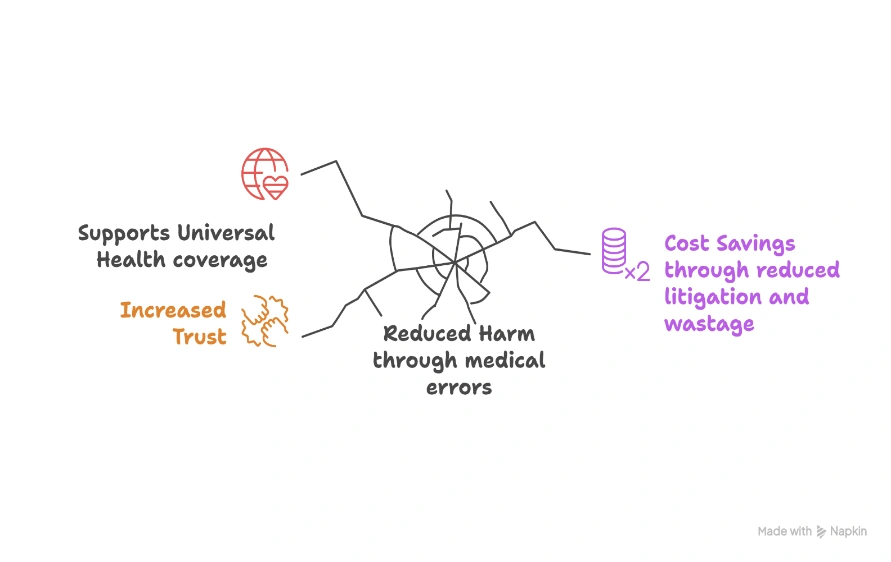Paper: GS – II, Subject: Society and Social Justice, Topic: Social Sector- Health, Issue: Strengthening patient care.
Context:
World Patient Safety Day observed on September 17 highlights the persistent challenge of ensuring safe healthcare. For India, with rising chronic diseases (cancer, diabetes, heart disease, mental health), the urgency of patient safety is critical.
Global scenario: 1 in 10 patients suffer harm during hospitalization. In outpatient care, it rises to 4 in 10.
Key Highlights:
Patient Safety Challenges in India:
- High Burden of Chronic Diseases:
- Long-term, frequent treatments → higher risk of safety lapses.
- Complex care with multiple specialists, tests, and medicines → coordination failures.
- Vulnerability in Hospital Care:
- Risks include:
- Hospital-acquired infections
- Unsafe transfusion practices
- Blood clots, preventable falls
- Delayed diagnoses, inappropriate prescriptions
- Risks include:
- Systemic Gaps:
- Overburdened providers, long shifts, staff attrition.
- Patients often passive participants in care.
- Safety systems exist but remain fragile under stress.
Steps Taken:
- National Patient Safety Implementation Framework (2018–25):
- Focus on reporting, embedding safety into clinical programs.
- Professional Networks:
- Organisations such as Society of Pharmacovigilance, India monitors drug reactions nationwide.
- NABH (National Accreditation Board for Hospitals & Healthcare Providers):
- Developed standards for patient safety, infection control, medication rights.
- But less than 5% of hospitals have full accreditation.
- Civil Society Initiatives:
- Patient Safety & Access Initiative of India Foundation works on regulatory clarity of medical devices.
- Patients for Patient Safety Foundation weekly outreach to 14 lakh households in addition to safety campaigns and awareness programs.
Further strengthening patient care:
Shared Responsibility: Patient safety cannot rest only on doctors and nurses. Families and patients must actively participate by asking questions, reporting adverse reactions and following safe practices such as no self-medication.
Building a Culture of Safety:
- WHO Global Patient Safety Action Plan: Integrate safety into all healthcare levels.
- Set up Patient Advisory Councils (PACs): Bring patient voice into hospital decision-making. High-income countries show PACs improve safety, communication, trust which India can adapt.
- Standardisation: Hospitals must meet accreditation standards, co-develop tech solutions such as error-preventing workflows and train staff in safety culture
Significance:

Way Forward:
- Embed Patient Safety in Medical Education through mandatory modules for doctors, nurses.
- Expand Accreditation: Incentivize NABH certification for hospitals.
- Empower Patients: Awareness campaigns on rights, safe practices.
- Leverage Technology: Digital records, AI tools for prescription safety.
- Public–Private Partnerships: Co-develop safety innovations.
- Community Engagement: Use local governance/CSR for grassroots awareness.
Conclusion:
Patient safety is the foundation of healthcare delivery. India must move beyond isolated reforms and adopt a holistic, systemic, and participatory approach. Building a culture of safety will ensure that healthcare in India is not only accessible but also safe for every citizen.
https://www.thehindu.com/opinion/op-ed/making-health-care-safe-for-every-indian/article70057965.ece
La Excellence IAS Academy, the best IAS coaching in Hyderabad, known for delivering quality content and conceptual clarity for UPSC 2025 preparation.
FOLLOW US ON:
◉ YouTube : https://www.youtube.com/@CivilsPrepTeam
◉ Facebook: https://www.facebook.com/LaExcellenceIAS
◉ Instagram: https://www.instagram.com/laexcellenceiasacademy/
GET IN TOUCH:
Contact us at info@laex.in, https://laex.in/contact-us/
or Call us @ +91 9052 29 2929, +91 9052 99 2929, +91 9154 24 2140
OUR BRANCHES:
Head Office: H No: 1-10-225A, Beside AEVA Fertility Center, Ashok Nagar Extension, VV Giri Nagar, Ashok Nagar, Hyderabad, 500020
Madhapur: Flat no: 301, survey no 58-60, Guttala begumpet Madhapur metro pillar: 1524, Rangareddy Hyderabad, Telangana 500081
Bangalore: Plot No: 99, 2nd floor, 80 Feet Road, Beside Poorvika Mobiles, Chandra Layout, Attiguppe, Near Vijaya Nagara, Bengaluru, 560040
